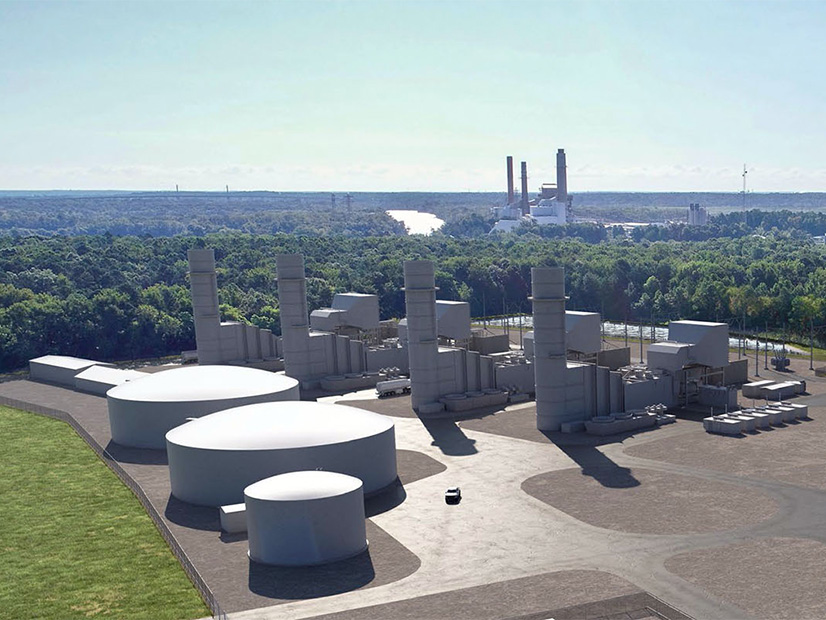
The Chesapeake Climate Action Network (CCAN) Action Fund on Thursday released a report arguing that Dominion Energy can meet growing demand for electricity in its territory with clean energy instead of building new natural gas plants, as it has proposed.
The report, which the environmental group commissioned from the consultancy Gabel Associates, pushes back against Dominion’s pending integrated resource plan that was filed with the Virginia State Corporation Commission this spring. (See Enviros Pan Dominion Integrated Resource Plan.)
“Unfortunately, Dominion’s plan is not compliant with laws passed by the General Assembly in 2020 and 2021, including the Virginia Clean Economy Act and regulatory directives to account for economic externalities associated with air pollution,” the report said. “As an example, Dominion intends to build 1,000 MW of new gas-fired generation capacity in Chesterfield County by 2027 even though doing so will generate more than 2 million tons of additional carbon emissions each year.”
The utility expects peak demand to grow by 2.32% and overall energy consumption by 3.25% annually, which the report said could be met while retiring coal- and gas-fired power plants using PJM’s generator replacement process to avoid queue delays, adding battery storage at existing sites, expanding behind-the-meter solar and increasing energy efficiency and demand response.
“Dominion has a chance to cut costs for Virginians by $28 billion and slash greenhouse gas emissions by 52 million tons over the next decade without compromising system reliability simply by switching out old fossil fuel plants for new solar panels and battery systems,” Gabel Associates Vice President Adrian Kimbrough said.
Dominion’s load growth projections are based on assumptions including significant growth in data centers in its territory, though the report said it is unclear if this growth is made up of projections or actual contractual arrangements. The projections also include efficiency and demand-side management, but the report questions whether those could be higher and lead to lower load growth.
The IRP has already seen proceedings in the SCC; in a brief filed in late October, Dominion said it had picked a middle path of data center growth out of three scenarios, which was reviewed by PJM, as the commission has required in the past. The first five years of that forecast are more certain than the later 10 covered in the IRP, the utility said.
CCAN and Gabel proposed an alternate resource plan, which would hold constant the current and contracted renewables Dominion has while accelerating the retirement of 8.5 GW of fossil fuel capacity that has operated for 20 years. The retired capacity would be replaced with a range of solar, including the company’s own utility-scale projects, behind-the-meter resources and contracts with third-party developers. Dominion would also need to add battery storage to sites of existing and planned renewable energy generators using PJM’s Surplus Interconnection Queue.
The report does not get into specifics for what should replace the retiring capacity and avoided new fossil plants because it is meant to provide a high-level alternative to Dominion’s proposals.
CCAN said the report bolsters the argument that a proposed 1,000-MW natural gas plant in Chesterfield is not needed. The group and some local citizens are opposing the plant’s construction.
Dominion told the SCC last month that dual-fuel combustion turbines like the one proposed for Chesterfield are “currently the most cost-effective and reliable resource” to meet a future long-duration winter event or capacity shortage. Other parties including Advanced Energy United and the Sierra Club have pushed back on its plans for new gas plants.
“Reliability is paramount to the company, and the significant increase in the load forecast, coupled with events like Winter Storm Elliott, have highlighted the need for dispatchable generation and the reliability benefits of natural gas units” to serve the company’s customers, Dominion said in its filing.
Dominion said the IRP is not the proper venue to litigate the need for specific power plants, as the SCC does not approve or reject any actual plants in such proceedings. The firm will have to apply for a certificate of need and public necessity for specific plants, which is where the need for actual powers is properly debated, it said.

